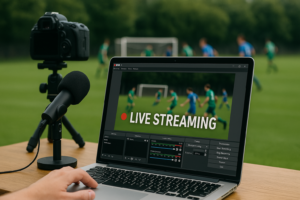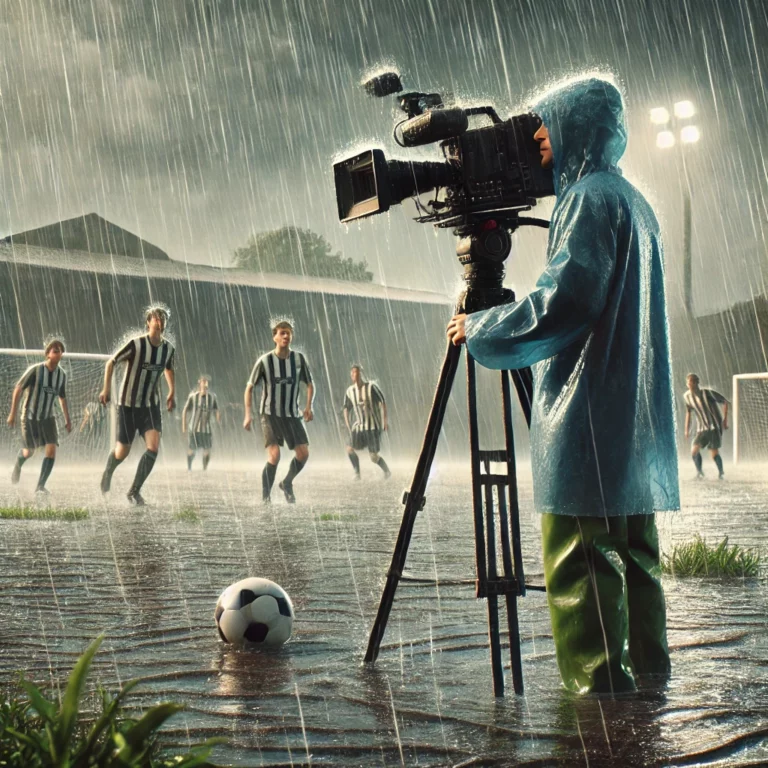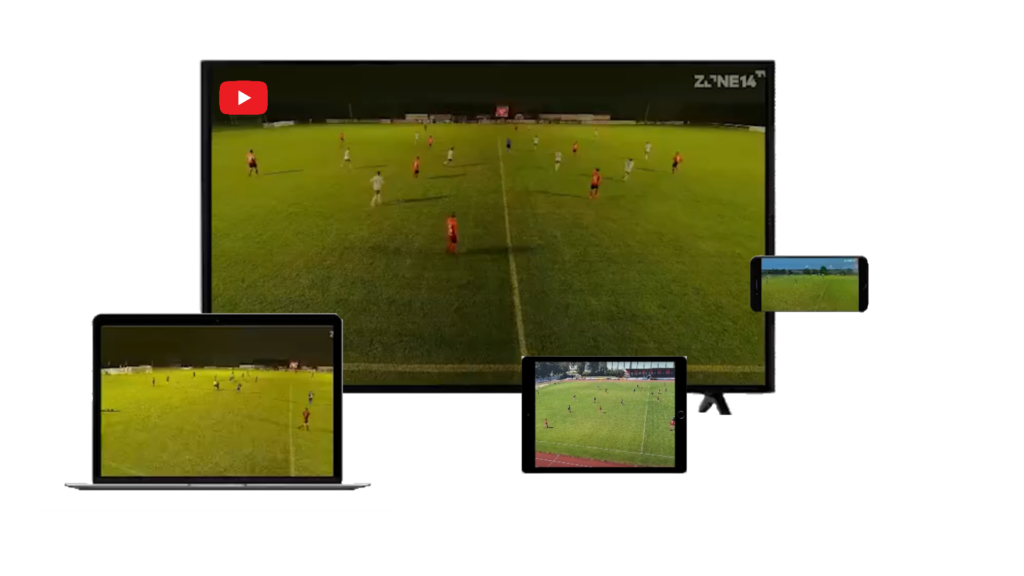
In the era of digitalisation, the way we consume sports, particularly football, has undergone a significant transformation. Gone are the days of relying on free to view television broadcasts or attending matches in person. Instead, the rise of football streaming services has brought convenience and accessibility to fans worldwide. However, this shift has not come without its challenges and controversies, particularly concerning affordability and ownership rights.
This blog explores the intricacies of football streaming rights and subscription services, highlighting the challenges faced by fans, the monopolisation of broadcasting rights, and the impact on lower league football.

The obvious problem frequently discussed is the cost of football streaming. Across the globe, fans are faced with the dilemma of shelling out significant sums of money for pay-per-view matches or committing to subscription services that often come with hefty price tags.
In recent years, the landscape of football broadcasting has dramatically shifted. Traditional TV networks no longer hold a monopoly on the rights to broadcast live matches. Streaming services like DAZN, Amazon Prime, and ESPN+ have entered the arena, bidding for exclusive rights to show top-tier football. This competition has driven up the costs of these rights deals, which are inevitably passed down to consumers in the form of higher subscription fees.
For instance, the English Premier League's (EPL) latest five-year broadcasting deal is worth an astonishing £5 billion. While this influx of cash benefits the top-tier clubs, it raises questions about the trickle-down effect on lower-league clubs. Critics argue that the majority of this wealth stays within the Premier League, making the rich richer while lower-league clubs continue to struggle financially. There is an ongoing debate about whether a more equitable redistribution of these funds could help sustain the grassroots level of football, which is crucial for the sport's long-term health.
In lower leagues, where financial resources are scarce, streaming services have become both a blessing and a curse. On one hand, they provide much-needed revenue streams; on the other, they impose stringent conditions on broadcasting rights, often at the expense of the clubs and their supporters. The deal between the National League and DAZN, which allows DAZN to broadcast National League matches globally, illustrates this complexity. While this agreement brings attention and financial support to lower-tier football, it also raises concerns about the over-commercialization of the game.
The recent deal signed by DAZN to stream the National League globally is a case in point. This deal allows DAZN to broadcast the National League's matches to an international audience, significantly boosting the league's visibility and revenue. However, it also means that local fans who might have had easy access to matches via more traditional means now have to subscribe to a global streaming service, which might not be as accessible or affordable. While this move is seen as a way to modernise and globalise the lower tiers of English football, it also highlights the growing disparity between top-tier and lower-league clubs in terms of revenue and fan engagement.

One of the most controversial aspects of modern football streaming is the control that streaming companies exert over the content. Some companies have sought to own the rights to any footage filmed inside stadiums, not just the content they produce with their own cameras. This means that even fan-recorded videos or TV broadcasts that show the game could be subject to restrictions or require permission from the rights holder. This has sparked significant debate within the football community, particularly in lower leagues where these companies' influence is more pronounced.
For fans, this control over content creates a frustrating experience. The very act of sharing a memorable goal, a controversial decision, or a thrilling match-ending moment with fellow fans on social media is increasingly fraught with legal risks. The desire of companies to monetize every aspect of the game has led to strict enforcement of broadcasting rights, leaving fans and even the clubs they support in difficult situations.
In the English Football League (EFL), the situation is particularly stringent. Under the EFL's Ticketing Terms & Conditions, fans are allowed to bring mobile phones into the stadium, but any material captured must be for personal and private use only. The rule clearly states that no material captured may be published or made available to third parties, including via social networking sites.
This rule has significant implications. Fans who innocently share a clip of a goal or a match highlight on Twitter or YouTube could be putting their club at risk of legal action. The club is then faced with the dilemma of enforcing these rules or facing potential fines and penalties from the league. This creates a scenario where the clubs are pitted against their own supporters, simply for following the rules.
What’s more perplexing is that the rule doesn’t explicitly ban the act of filming itself. Instead, it only becomes a breach of the regulation if the footage is shared publicly. This raises the question: How can such a rule be fairly enforced? Stewards at matches can’t reasonably monitor every fan’s phone activity, and yet clubs are required to uphold the league’s broadcasting rules.
Some vloggers have found creative ways to navigate these restrictions, such as filming their own reactions to incidents rather than the incidents themselves. This workaround, while legal, still highlights the absurdity of the current regulations. The overarching issue is that these rules, while designed to protect the league’s broadcasting rights, do little to differentiate between genuine copyright infringements and harmless fan engagement.
For instance, a Tranmere Rovers fan might film his reaction to a last-minute goal and share it online without showing any actual match footage. While this complies with the EFL's rules, it still illustrates the lengths to which fans must go to share their sporting experiences without falling foul of broadcasting restrictions.
The dilemma extends beyond just the legality of sharing content; it touches on the heart of what it means to be a fan. Sharing match highlights and personal experiences fosters a sense of community and keeps the spirit of the game alive. Yet, under the current rules, this could inadvertently cause harm to the very club that fans are trying to support. There’s an argument to be made that the EFL's blanket approach to content sharing lacks common sense. While protecting commercial interests is important, it shouldn’t come at the cost of alienating the fanbase.
In many ways, the enforcement of these rules feels like a misalignment of priorities. The focus should be on promoting the game and building fan engagement, especially at a time when football is becoming increasingly commercialised and distant from its grassroots. Allowing clubs some discretion in how they enforce these rules could strike a better balance between protecting broadcasting rights and nurturing fan culture.

Importantly also financial support to clubs through streaming revenue can be key, particularly those operating in lower leagues or struggling to stay afloat financially.
Yet, even as football streaming becomes more accessible and widespread, new challenges emerge on the horizon. Non-league and semi-professional clubs are increasingly being exploited for their footage, with third-party streaming services profiting from the commercialisation of grassroots football. This trend not only threatens the integrity of the game but also undermines the efforts of local communities to support and sustain their clubs.
We can also report that there are similar cases as seen in the EFL, starting to happen in the lower levels of the game in Europe. Stream providers have been attempting to control, not just broadcast footage, but all footage recorded in non-league stadiums. Whilst, unfortunately fans have got used to the regulations at the higher levels such as the EFL. It comes as a big shock and almost an insult to the many hardworking, dedicated volunteers in semi-pro/amateur football that streaming companies could attempt to take advantage of, and control streaming and image rights for very little in return.
The future of football streaming is at a crossroads. On one hand, the influx of money from broadcasting deals is crucial for the sport’s development, particularly at the highest levels. However, there’s a real danger that this commercialization could alienate the very people who make the sport so special: the fans.
Lower league and semi-professional football, in particular, face a delicate balancing act. Streaming services provide much-needed revenue and exposure, but the control exerted by these companies can also stifle the organic growth and community spirit that are so vital at these levels of the game.
The key moving forward will be finding a way to balance commercial interests with the needs and desires of the fans. Whether this involves rethinking how broadcasting rights are distributed, providing more equitable financial support to lower league clubs, or simply allowing more flexibility in how content is shared, the goal should be to preserve what makes football unique: its ability to bring people together, from the Champions League to the smallest grassroots club.
As streaming continues to reshape the football landscape, stakeholders must ensure that the sport remains accessible to all, not just those who can afford the highest subscription fees. And arguably, the most important consideration should be the dedicated community clubs at the lower levels, and ensuring that they are never exploited through digitalisation in football.
The evolution of football streaming should not come at the cost of its soul.

At zone14, lower league clubs remain always at the heart of our vision. Through zone14, amateur/semi-pro teams can not only analyse their matches but also stay in complete control of their footage through our streaming solution zone14 LIVE auch die volle Kontrolle über ihr Videomaterial.
Additionally, with our new ‘ClubTV / VereinsTV’ package, clubs can stream matches on their own website and decide for themselves how many fans pay for the stream and their camera system With zone14 the control always remains in your hands.
Sind Sie daran interessiert, Live-Streaming für Ihren Verein einzuführen? Kontaktieren Sie uns jetzt!